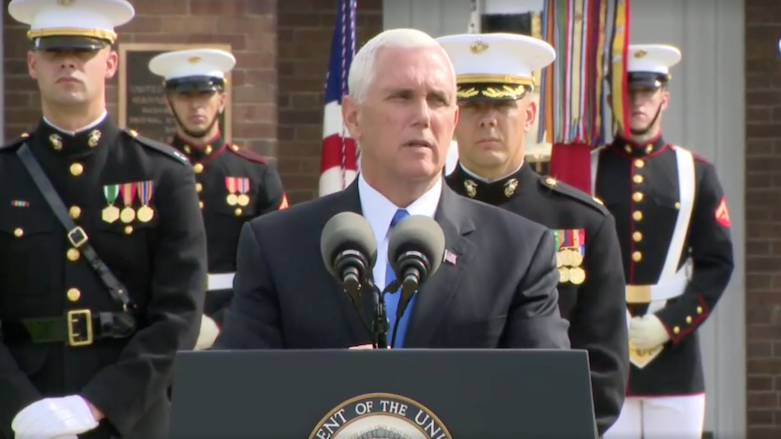Mike Pence: US will not sit idly while Iranian Ayatollahs plan more attacks

WASHINGTON DC, United States (Kurdistan 24) – US Vice President Mike Pence on Monday slammed Iran for continuing to “funnel funds and weapons for the terrorists to shed blood and sow chaos throughout the world.”
Speaking at an event to commemorate the anniversary of the 1983 bombing of the Marine barracks in Beirut, Lebanon, Pence said Iran had supported the terrorists and is doing so now while glorifying its actions.
“Iran praises the attackers and remembers them as martyrs,” Pence said.
The Vice President said his government, under President Donald Trump, is resolved to take decisive action and end “Iran’s aggression.”
“The United States of America will no longer tolerate Iran’s support of global terrorism,” Pence said, adding Trump’s administration “will not sit idly by while Ayatollah’s plan more attacks.”
Trump is also expected to designate Iran’s most powerful security force, the Revolutionary Guards Corps (IRGC), as a terrorist organization, as part of a broader US strategy on Iran.
Pence’s remarks come shortly after other high-ranked American officials used harsh language while speaking about Iran.
Lieutenant General H.R. McMaster, the 26th Assistant to the President for National Security Affairs, on Friday compared Iran to the Islamic State (IS) and other terrorist groups.
“Iran is very good at pitting communities against each other. It is a hegemonic design and a threat they share with [IS] and al-Qaeda,” the White House National Security Advisor said at the 2017 Foundation for Defense of Democracies (FDD) National Security Summit.
Speaking about the Kirkuk take over by Iraqi forces and Iranian-trained Shia militias, McMaster said that “Iran has to stop using illegal armed groups in Iraq at the expense of regional security and stability.”
The Trump administration’s desire to contain Iran has not translated to support for Kurds. In fact, McMaster emphasized Washington’s interest in a unified Iraq, provided the country could free itself from Iranian influence.
“What we would like to see in Iraq is a stable Iraq that is not aligned with Iran,” he said without explaining why the US seemed to betray its Kurdish ally.
Mike Pompeo, the Director of the Central Intelligence Agency (CIA), similarly lashed at Iran, saying at the FDD that he saw Iran at the heart of the Kirkuk problem but also many other problems in the Middle East.
“[President Trump] has come to view the threat from Iran is at the center of so much of the turmoil that bogs us down in lots of places in the Middle East,” Pompeo said.
“You can see the impact that they are having today in northern Iraq. The threat that they pose to US forces. We had an incident last week,” the CIA director said.
Answering interviewer Juan C. Zarate’s point that reports indicated Iranian Quds Force commander Qassem Soleimani was in Kirkuk this week, Pompeo interjected, “I’m aware of that.”
Pompeo mentioned Iran’s growing influence on other groups such as the Lebanese Hezbollah, Houthis in Yemen, and Shia militias in Iraq known as the People Mobilization Forces (PMF) or Hash al-Shaabi.
He also criticized the Iran deal and added that it has not, in reality, curtailed “Iranian adventurism, the terror threat, [and] malignant behavior.”
For its part, Iran has responded to threats with their own threats, warning Tehran would tear the nuclear agreement apart in “a matter of hours” if new sanctions were issued.
Speaking to the parliament in August, Hassan Rouhani directly threatened the US that Iran could restart its nuclear program “in an hour and a day” if the former continued its “threats and sanctions.”
“Those who try to return to the language of threats and sanctions are prisoners of their past delusions,” Rouhani said in his televised address.
In 2015, Iran signed an agreement with the five-plus world powers to curb its nuclear program in return for lifting most international sanctions.
Despite the US’ emphasis on containing Iran, their goal of “ensuring that the Abadi government in Iraq is successful,” has offered leeway to Iran to assist in a swift takeover of Kirkuk which has displaced some 170,000 Kurds.
In fact, analysts argue that the US has, unwittingly, assisted Iran with its regional ambitions.
The US officials criticize Iran for dividing communities, including Kurds, and establishing influence in Iraq and Syria. But, Washington’s inaction in Kirkuk allowed Iran to achieve those very goals.
“The conflict in Kirkuk offers further evidence of Iran’s steady rise,” said Emma Sky, author of “The Unraveling: High Hopes and Missed Opportunities in Iraq,” who served in Iraq from 2003 to 2004 as the governorate coordinator of Kirkuk.
“Iran is showing everyone in the region that it is the indispensable ally—not the United States,” Sky wrote.
She added that Iran mediated a deal between the Patriotic Union of Kurdistan (PUK) and the Iraqi government and guided the Shia militias supporting the Iraqis.
“[Iran] is securing its corridors across Iraq and Syria, mediating between the different groups on the ground, while the United States occupies a shrinking space.”
“Iran has every interest in maintaining these militias—making it increasingly difficult for any Iraqi Prime Minister to demobilize them. And Turkey, which used to be a US ally, is moving closer to Iran and Russia,” Sky said.
Editing by Karzan Sulaivany
